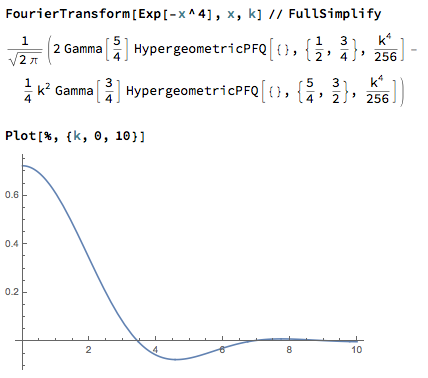Positivity of certain Fourier transform
A simple argument that the Fourier transform cannot be nonnegative for any $m>1$, integer or not, is given in my 1991 paper with Odlyzko and Rush:
Noam D. Elkies, Andrew M. Odlyzko, and Jason A. Rush: On the packing densities of superballs and other bodies, Invent. Math. 105 (1991), 613-639.
The Fourier transform $f$ of a nonnegative even function must satisfy $4f(\xi) \leq 3 f(0) + f(2\xi)$ for all $\xi$. This fails for any $m>1$ once $\xi$ is close enough to (but not equal) zero.
Postscripts:
0) The inequality $4f(\xi) \leq 3 f(0) + f(2\xi)$ holds because the difference is $\int_{-\infty}^\infty \hat f(\eta) \, w(\eta) \, d\eta$ with $w(\eta) \geq 0$ for all $\eta$ because $3 - 4\cos \theta + \cos 2\theta = 8 \sin^4 (\theta/2) \geq 0$.
1) The nonnegativity of $3 - 4\cos \theta + \cos 2\theta$ is also a key ingredient in the proof of thenonvanishing of the Riemann zeta function $\zeta(s)$ on the edge $s = 1+it$ of the critical strip, and thus of the Prime Number Theorem. See the last exercise of this chapter my notes on analytic number theory.
2) Sergei noted that it is also known that for $0 < m \leq 1$
the Fourier transform is positive. As I wrote earlier this year
on Math Stackexchange,
the same paper with Odlyzko and Rush also proves that fact as follows,
crediting the argument to B.F. Logan (see Lemma 5 on page 626).
We first prove this for $m=1$, then reduce $0<m<1$ to this case.
For $m=1$, the function $\exp(-t|\xi|^{2m})$ is a Gaussian,
and thus so is its Fourier transform; Gaussians are positive everywhere,
so the case $m=1$ is done. For $0<m<1$, the function
$\exp(-t|\xi|^{2m})$ is a nonnegative mixture of Gaussians $\exp(-c\xi^2)$ by
Bernstein's theorem.
Therefore the Fourier transform is also a nonnegative mixture of Gaussians,
so again positive everywhere. QED
it is positive for $m=1$, but not for $m=2$, see this Mathematica output:

I think the result goes back to Polya, see "Some theorems on stable processes" by Blumenthal and Getoor. Another reference is Paul Lévy "Sur une application de la dérivée d’ordre non entier au calcul des probabilités" page 1118 of CRAS 1923.
It might be good to also give the gist of Levy's very simple argument: if the Fourier transform was positive then the exponent would be the log-moment generating function of a random variable $X$. But if $m>1$, the second derivative at the origin vanishes and thus also the variance of $X$. The positive function would be a delta function which is a contradiction.